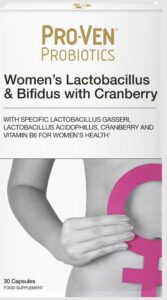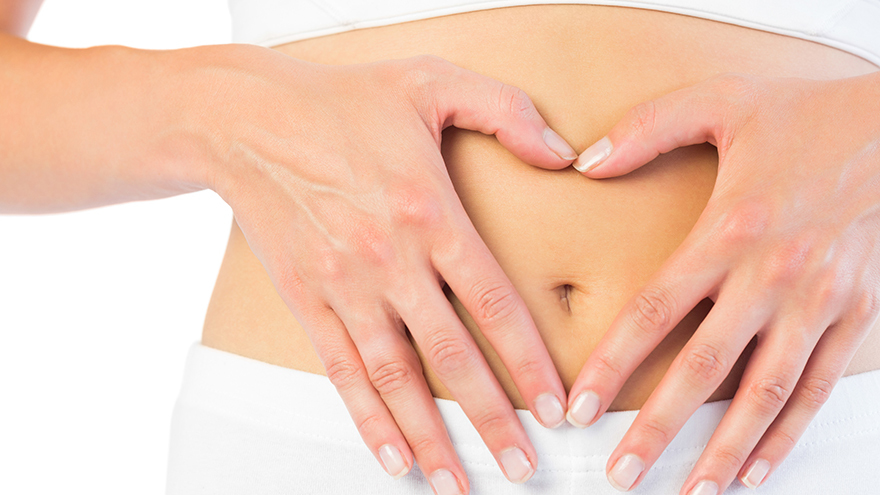Menopause & Gut Health – The Natural HRT?

Are you suffering from menopause symptoms? The key to solving the hormonal imbalance of menopause could be inside you, literally, in your gut.
Our gut microbiome – the trillions of bacteria in our gastrointestinal tract – influences everything from our mood and energy levels to sleep quality and immunity, and it also affects our oestrogen levels, making it an important player when it comes to managing the menopause, at a time when oestrogen drops off.
We already know about the gut-brain connection and how keeping our gut healthy and diverse makes us happier. Serotonin and dopamine, which affect mood and behaviour, are produced by the bacteria in the gut.
But now there’s growing research on the link between a healthy gut and balanced hormones. That’s why supporting gut health during menopause – through diet, lifestyle changes and taking a daily probiotic supplement – is crucial.
“Transition rather than turmoil”
 “The menopause can be a very intimidating and confusing time for women with common symptoms of oestrogen deficiency being disturbed sleep, hot flushes and mood changes,” explains nutritional therapist and gut health expert Kate Cook. “But with lifestyle and dietary tweaks, it can simply be a transitional phase rather than a time of hormonal turmoil.
“The menopause can be a very intimidating and confusing time for women with common symptoms of oestrogen deficiency being disturbed sleep, hot flushes and mood changes,” explains nutritional therapist and gut health expert Kate Cook. “But with lifestyle and dietary tweaks, it can simply be a transitional phase rather than a time of hormonal turmoil.
“A healthy, diverse gut microbiome is able to influence oestrogen levels and recycle it back from your gut into your circulation, making optimum use of this precious hormone at a time when the female reproductive organs no longer produce it and reducing the negative symptoms of the menopause,” adds Kate. “A happy gut that is running well is the answer to menopausal bliss.
Kate’s 5-step plan for boosting your gut-hormone connection
-
Adopt a gut-healthy diet
The first step to a gut-healthy diet is to balance your blood sugar by eating “real food” – food you have to cook and prepare. Fibre-dense real food nurtures friendly bacteria in the gut which like to “make a nest” in fibrous material transiting through the bowel.
Choose foods that are:
- thick and hard to chew (like rye bread)
- fibrous (covered in skin, or with plenty of fibre, like broccoli)
- high in protein (fish, chicken)
- good fats, like coconut, butter and olive oil
- fermented foods, such as kefir and sauerkraut – these are also great for the gut.
Some foods – such as soya, lentils, chickpeas, garlic, celery, sage, fennel and parsley – contain phytoestrogens and have a beneficial hormonal effect too, so include these when you can.
- Avoid foods that are sweet and fluffy (like popcorn or white processed bread) which contribute to blood sugar instability.
- Avoid alcohol or drink it in moderation, as it particularly affects hot flushes and upsets the microbiome.
-
Protect your liver
The liver is the “factory’ in our bodies where hormones are processed, taken to bits, and recycled. If the gut is not functioning well, the liver has to work harder to keep up and menopausal symptoms, especially flushes, might be worse.
As well as a daily probiotic to keep the gut microbiome diverse, the liver loves bitter foods like artichokes and rocket.
-
Watch your stress
After the menopause, the adrenal glands, which contain stress hormones, also produce oestrogen. However any stress will wipe this precious resource out.
Introduce some stress reduction tactics such as exercising regularly, practising meditation or even simple breathing exercises.
For example, breathe in for a count of four seconds, retain your breath for four seconds, exhale for four seconds, then retain for another four seconds – then repeat the whole cycle six times. Doing this daily will deepen your breathing and help you relax.
-
Focus on sleep
The vicious cycle of poor sleep, leading to stress, tiredness, low mood and depression is not a pretty one. Check your thyroid function with your doctor, as the thyroid controls the body’s temperature and any dysfunction could exacerbate restless nights.
Try to adopt good sleep hygiene by avoiding light intrusion before bed (charge your phones out of the bedroom) and keeping your room at a cool temperature. Herbs such as lemon balm, or hops which contain phytoestrogen, can also be useful.
-
Take a probiotic
 Your gut is where so much of the magic happens in terms of health and vitality and a trouble-free menopause. The gut is packed with friendly bacteria which is vital for our energy, immunity and even our mental health.
Your gut is where so much of the magic happens in terms of health and vitality and a trouble-free menopause. The gut is packed with friendly bacteria which is vital for our energy, immunity and even our mental health.
A probiotic supplement, such as ProVen Probiotics for Women (RRP £18.95), can help with developing a diverse bacterial “nest” balancing hormones and reducing menopause symptoms.
Each one-a-day capsule contains 17.5 billion live bacteria with multiple beneficial bacterial species to keep the microbiome diverse and healthy (including two Lactobacillus acidophilus strains and Lactobacillus gasseri – a key part of the vaginal flora which protects against urinary tract infections and thrush).
It also contains cranberry extract and vitamin B6, which contribute to the regulation of hormonal activity.
Available from https://provenprobiotics.co/uk/








